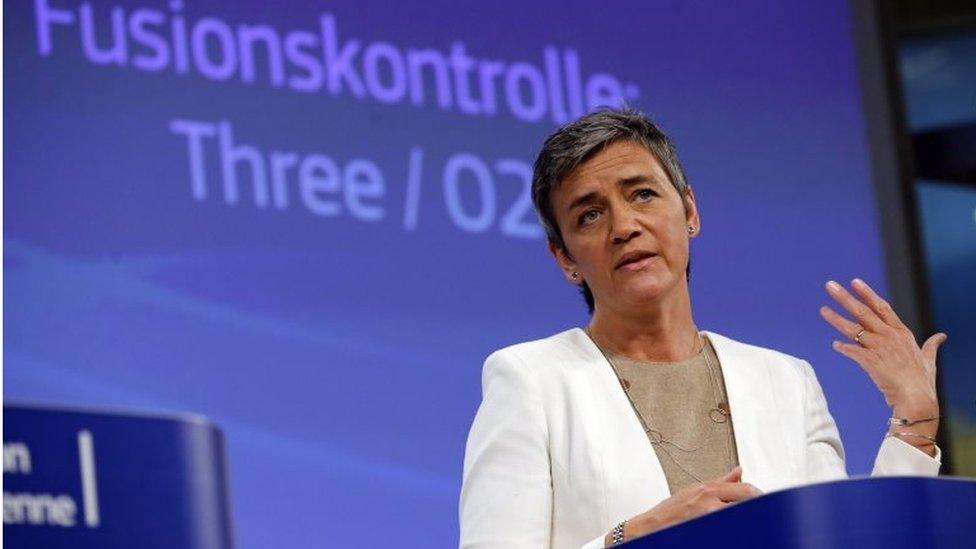O2, Three and our 5G future
- Published

The UK would have been reduced to three major phone network operators
It was the deal that was supposed to be the final stage in the reshaping of Britain's mobile phone market. But now the O2/Three marriage has been blocked by Brussels, where does that leave phone users?
Better off, according to regulators. The UK's communications regulator Ofcom, in particular, had argued that allowing the number of players in the market to fall from four to three would inevitably lead to higher prices, poorer service or both.
This sounds convincing in the short term. But, says much of the telecoms industry - if you look at the longer term health of Europe's mobile market - today's move is bad news for everyone.
Let's come to that argument in a moment. But even in the short term there is one reason for concern and it can be summed up in two letters: BT.
The merger between BT and EE was nodded through, despite the fact Ofcom had highlighted potential competition concerns, external.
The reason it was not blocked was apparently because BT was not really a player in mobile. But its rivals point out that the combined firms now have control of 40% of mobile airwaves and the lion's share of the UK's fixed broadband infrastructure.
After the European Commission's decision, this behemoth now looks relatively unchallenged - although if O2 ends up in the hands of Virgin Media-owner Liberty Global that could change.
Now, the longer term, pan-European perspective. There is a mounting anxiety in the telecoms industry that Europe has lost its way over the last decade.
In the GSM era, a mobile standard framed on the continent made European companies, notably Nokia, the global leaders. But first in 3G, and more so in 4G, both the United States and now China have been faster in rolling out the new networks, and Europe has lost its lead.
The big operators put the blame on too much competition and over-regulation. They argue that Brussels should focus on competition across the EU, not in individual markets, pointing out that while Europe has dozens of competing operators, the US has just a handful, each earning much more from users than is possible here.

The EU's Competition commissioner Margrethe Vestager was unwilling to approve the merger
The result, they say, is a lack of investment - and with 5G networks just around the corner that becomes ever more urgent. The argument is of course self-serving, and many economists will tell you there is no evidence that greater competition is a barrier to investment.
But, having acted in what they see as consumers' interests when it comes to this merger, regulators in London and Brussels must now look to the longer term.
Do they believe Europe is in good shape for the 5G future where everything is connected via mobile networks? And if not, what are they going to do about it?
For its part, the European Commission says, external the proposed O2-Three deal would have "hampered" 5G's rollout in the UK, since the merged business would have retained its stakes in two separate network-sharing agreements.
At present, these allow EE-Three and Vodafone-O2, respectively, to split the costs of building new infrastructure.
By keeping a stake in both, the regulator says, the new business would have been able to keep watch over both its competitors, and potentially put the brakes on 5G.
Of course, O2 and Three could have chosen to participate in just one of these network-sharing pacts. That way, the regulator may not have felt compelled to call the whole thing off.